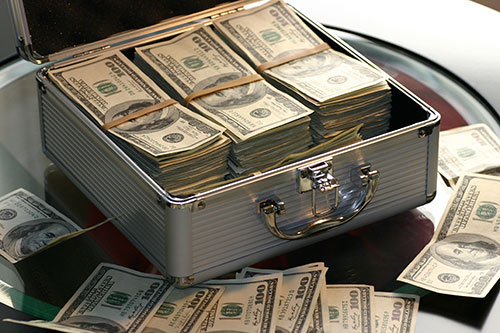Where Does Lottery Money Come from?

Every day, people spend millions of dollars across the globe to test their luck and possibly become millionaires. Lotteries make massive promises, and through the years, they have changed many lives. But how exactly does that happen? Where does lottery money come from, and is there ever a risk of prizes not being paid out?
The lottery premise is pretty simple, and such games rely on a self-fueling mechanism.
Luckily, the way that national and official local lotteries have been set up guarantees payouts every single time you win.
So, Where Does the Lottery Prize Money Come from?
Let’s start with the short answer – it comes from your pocket.
No, we’re not kidding! As a player, you are contributing to the prize pool that will be distributed among winners.
Official lotteries work in a very specific way that is usually announced by the authorized entity that operates games. Such transparency is required by law to ensure fair and just operations.
To participate in a lottery, you spend money on a ticket. And you’re not alone. Dozens of other people do the same. The funds generated through ticket sales are used in a couple of important ways. For a start, a percentage of the money is given back to players in taxes. Another portion goes to support social and charitable causes. The remaining sum is considered operational cash that’s invested back into the lottery.
Let’s check out an actual real-life example to make things more straightforward.
SuperEnalotto is probably one of the most famous Italian lotteries. It’s known for some massive jackpots that have attracted players from across the world. SuperEnalotto prizes are financed in the way mentioned above. With each drawing, 60 percent of the money generated through ticket sales goes back to prizes.
Here’s another example. In the US, Texas Lottery has an exact breakdown of what happens to the money generated through ticket sales. Of all funds, 65.1 percent are paid back in the form of prizes. The remainder is divided as follows – 25.5 percent go to the Foundation School Fund, 5.4 percent are dedicated to retailer commissions, 3.7 percent are used for administrative costs, and the remaining 0.3 percent of the money is transferred to Texas Legislature for allocation.
If you’re curious about the size of the prize pool and how the rest of the money is allocated, visit the official website of your favorite lottery. There, you should be capable of easily finding such information.
Jackpot Rollovers: A Powerful Source of Money
Now that you know the basics of where does the lottery money come from let’s move on to some more intriguing details.
The basic premise is understandable, but you’re probably asking yourself how record-breaking jackpots come into existence.
There’s one more way that lottery organizers use to attract bigger earnings through more ticket sales.
Many games out there have a rolling jackpot. This applies to some of the biggest lotteries like Powerball, Mega Millions, and EuroMillions, for example. In the event of no winner during one drawing, the jackpot that hasn’t been snatched rolls over towards the next drawing. This sum is added on top of the funds generated through ticket sales.
The mechanism is very, very clever. Roll-over jackpots are so attractive that people have been known to line up in long queues to buy tickets. Whenever jackpots are super high, the number of tickets sold also increases exponentially. This is a win-win situation for the lottery. The money for a massive jackpot has been guaranteed from the previous drawing, and there’s also a bigger income coming in because of the increased ticket sales.
Let’s go for an actual example, once again.
At the beginning of 2016, the Powerball jackpot became the biggest ever jackpot across the world. It reached 1.4 billion dollars, and America went crazy.
Ticket sales increased so much that they boosted the 1.3-billion-dollar jackpot from the previous week to 1.4 billion dollars. One week later, the jackpot reached 1.5 billion dollars, and everybody went crazy with a lottery fever. People flocked across state lines, and they even arrived in the US from neighboring countries to play and get their tickets. The frenzy fueled the lottery to unprecedented heights, showing you just how clever roll-overs are.
The Annuity Finances
Here’s one final thing we need to discuss when it comes to lottery money and when it comes from.
Lotteries can earn an income from the prizes that players win. Yep, you’ve read the previous sentence correctly. If you win the lottery’s jackpot and choose the annuity payment plan, you’ll allow the lottery to make some money on your behalf.
Annuity payments, as the name suggests, mean you’ll be getting equal annual payment for several years and until the entire jackpot amount reaches your bank account. When the money remains with the lottery for such a long time, that organization can earn an interest rate on the sum that hasn’t been paid to you.
This is why players who choose the annuity payment plan will end up getting more money than those who prefer a single lump-sum payment. And while it may be very lucrative to get the millions upfront, annuity payments are a smarter choice when it comes to getting more money and keeping yourself from wasting it all on dumb stuff.
So, these are the main ways in which lottery money for prizes is generated. You probably know now there’s no risk or chance for you not to get paid when playing legitimate games. Lottery enterprises employ a number of different monetization methods, and the cash will always be there. All that’s left for you now is to get lucky and match all of the required winning numbers!

Jonathan White is the founding editor of LotteryPros and one of the original voices behind the platform. With extensive experience in both lottery journalism and digital publishing, Jonathan helped shape the site’s mission of transparency and unbiased reporting. He specializes in reviewing global lottery platforms, analyzing industry trends, and guiding the editorial vision of LotteryPros. His work has set the standard for clarity, fairness, and player-first reporting since day one.